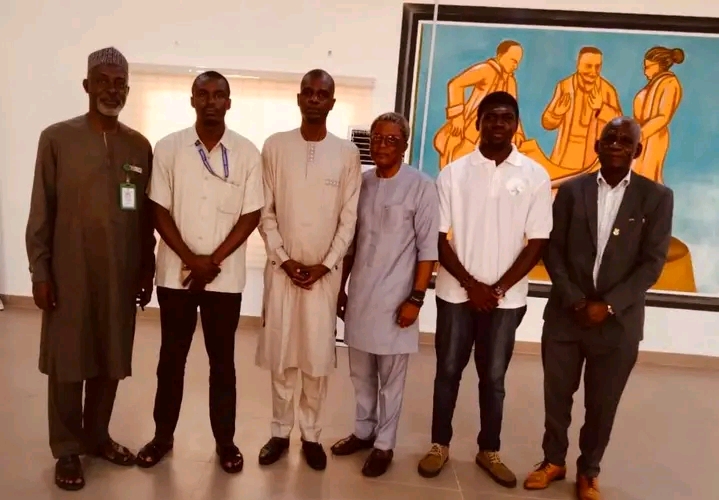News Analysis – By Abdul Lauya
In a time when many Nigerian universities are battling stagnation, Federal University Lokoja (FUL) stands out as a model of transformational leadership, thanks to the steady hand and strategic vision of its Vice-Chancellor, Professor Olayemi Durotimi Akinwumi.
Appointed in 2021, the quiet but firm academic has steered FUL into an era of accelerated growth, global recognition, and academic innovation. From international partnerships to institutional reforms and the recent U.S. recognition of its students, FUL is evolving rapidly, under the capable leadership of a man who understands the power of purposeful change.
In just four years, Professor Olayemi Durotimi Akinwumi has rewritten the narrative of what transformative leadership in Nigerian higher education can achieve. A man of few words but much action, Akinwumi, a consummate scholar with deep administrative roots and international academic acclaim, has embedded in FUL the critical building blocks of an institution aiming for greatness.
Today, FUL is not only sending students to prestigious U.S. exchange programs like the 2025 Study of the U.S. Institutes (SUSI) on Natural Resources, it is also building strategic partnerships at home to produce leaders equipped for Nigeria’s legislative, developmental, and democratic future.
From Keffi to Lokoja: The Man Behind the Momentum
Born on January 20, 1964, Professor Akinwumi holds a BA, MA, and Ph.D. in History from the University of Ilorin. His postdoctoral stints include academic training and research fellowships in Germany (including at Freie Universität Berlin) under prestigious awards like the Alexander von Humboldt and DAAD fellowships.
Before his appointment at FUL, Akinwumi served as Deputy Vice-Chancellor at Nasarawa State University, Keffi (NSUK), where his administrative aptitude became evident. His scholarship spans over 70 international publications, and he is a Fellow of both the Nigerian Academy of Letters and the Historical Society of Nigeria. But it is at Federal University Lokoja that his academic pedigree has intersected with transformational leadership most visibly.
Academic Expansion: From Faculties to Flagship Programs
From the moment he assumed office, Professor Akinwumi made clear his vision: to build FUL into one of Africa’s top ten universities. He moved swiftly. Within his first 100 days, the university established new faculties, including Engineering and the College of Medicine. Under his watch, FUL’s program offerings grew from fewer than 25 to over 60, spanning undergraduate, postgraduate, and professional tracks.
One of the most strategic moves was the partnership with the National Institute for Legislative and Democratic Studies (NILDS), the capacity-building arm of the Nigerian National Assembly.
This alliance now allows FUL to offer PhDs and Masters in highly specialized areas such as: Legislative Studies; Parliamentary Administration; Election and Party Politics; Public Sector Management; Border and Migration Studies; Leadership and Development; Security, Peace, and Strategic Studies and Social Work amongst others.
This partnership has already begun to bear fruit: FUL recently graduated the pioneer class of its Institute of Governance and Development Studies (IOGADS)—a hub aimed at training Africa’s next-generation leaders in public policy, development practice, and peacebuilding.
Global Engagement: The SUSI Breakthrough
Perhaps no single event captures Akinwumi’s internationalist vision better than the recent announcement of two FUL students, Esenyi Daniel Sokoyebomi (Zoology) and Abdulsalam Abdullahi Ahmed (Microbiology), selected for the prestigious U.S. Department of State SUSI exchange program on Natural Resources. The five-week leadership program, held at the University of Nevada, Reno, will expose the students to global best practices in environmental sustainability and leadership.
Such visibility is not coincidental, it is the result of careful cultivation of international relations, supported by recent visits and partnerships with U.S. Embassy officials and foreign institutions. It follows similar gains like the donation of 120 desktop computers by Canadian organization Changing Rural World e.V., reinforcing FUL’s march towards digital transformation.
Infrastructure, Innovation, and Institutional Reforms
Akinwumi’s legacy also includes a bold infrastructural development agenda. New lecture theatres, laboratory facilities, student hostels, and administrative blocks have been built across both the Adankolo and Felele campuses. The VC has also pushed for digitization, ethical reforms, and transparent processes in admissions, procurement, and promotion.
Social harmony, which often eludes public institutions, has been a hallmark of his administration. He is known for open-door policies, a calm demeanor, and an ability to engage unions, students, and staff with respect but firmness.
The Verdict: A Quiet Revolution with Lasting Impact
In the often noisy and transactional world of Nigerian academia, Professor Olayemi Akinwumi’s style is refreshingly different. Understated, deliberate, yet resolutely visionary, his leadership at FUL represents a quiet revolution grounded in academic integrity, strategic partnerships, and a passion for excellence.
As FUL continues to break new grounds, graduating its first doctoral students in governance-related disciplines, expanding global collaborations, and empowering undergraduates for international leadership roles, there is little doubt that the foundation now laid will serve generations to come.
Under Professor Akinwumi’s capable hands, the university is not only rising, it is redefining what it means to be a 21st-century institution in Nigeria. His tenure is proving that humility, intellect, and strategic foresight can indeed move mountains, and build legacies.
And when the history of Nigeria’s higher education renaissance is eventually written, Professor Akinwumi’s chapter will be one of substance, humility, and transformation.
For advert placement and inquiries, publication of press releases, and news coverages, please call: Phone: 08052898434 Email: editor@eyereporters.com, click here to view the advert rates.



